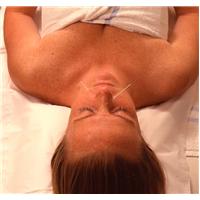
London: Stress may be experienced as a result of exposure to a wide range of demands and if left unchecked it can have an enormous impact on your health.
According to the UK Government’s Health and Safety Executive (HSE), a total of 12.8 million working days were lost to stress, depression and anxiety in 2005. Work-related stress accounts for over a third of all new incidences of ill health.
Stress can be caused by any number of things, including family, relationships and financial concerns. This is sometimes exacerbated at this festive time of year, when the focus on parties and presents can bring problems sharply in to focus. Links between stress and poor health include high blood pressure, allergies, migraines and depression. In extreme cases it can cause psychological problems such as Post Traumatic Stress Disorder or Cumulative Stress Disorder.
How can acupuncture help?
Traditional Chinese philosophy states that our health is dependent on the body’s motivating energy, known as qi, moving in a smooth and balanced way through a series of channels beneath the skin. Stress, anger, or any intense emotion acts like a traffic jam, blocking the free flow of energy in the body. Many people who are very stressed experience upper back, shoulder and neck pain. This is because stress causes the snarling up of the energy passing through channels in these areas causing pain, tension and stiffness often resulting in headaches as well.
Through acupuncture, these energy blockages can be addressed. Acupuncture can help energy flow smoothly, and alleviate not only the symptoms of stress and anxiety, but the stress and anxiety itself. In addition, acupuncture improves circulation of blood throughout the body. The calming nature of acupuncture also helps decrease heart rate, lowers blood pressure and relaxes the muscles.
Acupuncture can help by:
reducing risk of further health implications
reducing the number of sick days taken
offering an effective preventative treatment for stress
making stress easier to handle
Research
Research by JC Butler et al (2005) was conducted on 55 patients suffering from stress-related emotional disorders. All patients were treated with acupuncture for the condition and the total effective rate for the reduction of symptoms in all 55 patients was 95.4%
In Scotland research was conducted among hospice staff who were measured for stress using a psychological profile and then tested again following four acupuncture treatments. A 44% reduction in stress was recorded (2002).
For more information and therapists go to www.acupuncture.org.uk
About the BAcC:
The British Acupuncture Council (BAcC) has a membership of over 2,500 professionally qualified acupuncturists. It is the UK’s largest professional body for the practice of acupuncture.
BAcC members practise a traditional, holistic style of acupuncture diagnosis and treatment based on a system developed and refined over 2,000 years. To achieve BAcC membership, practitioners must first undertake extensive training in traditional acupuncture (minimum three years full-time or part-time equivalent), which includes physiology, anatomy and other biomedical sciences appropriate to the practice of acupuncture.
